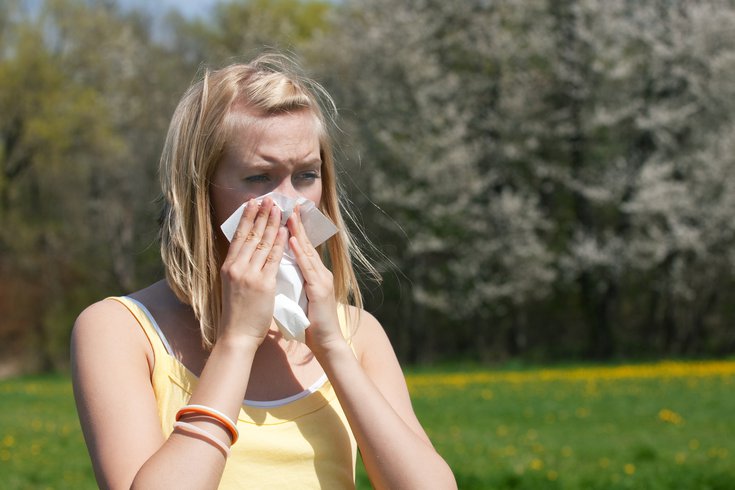
April 17, 2023
 Source/Image licensed from Ingram Image
Source/Image licensed from Ingram Image
Common allergy treatments include antihistamines like Claritin and Allegra, nasal steroid sprays, eye drops, inhalers and allergy shots.
It is the most wonderful time of the year: Spring allergy season. The high pollen counts cause a lot of runny and stuffed noses, and sinus headaches.
It can be particularly frustrating for people who take allergy medications and are still suffering. They may wonder whether this is just a more difficult spring or if their allergy medications are no longer working.
According to The Healthy, here are some signs you may need to revisit your treatment plan:
1. Frequent sinus headaches – If you are getting headaches almost every day, but only during prime allergy season, your allergies are probably the trigger. Sinus headaches generally cause a dull ache above the eyebrows and around the cheeks. They also may cause post-nasal drip.
2. Bruising under the eyes – If you wake up looking like you got into a fight while you were sleeping, that shiner most likely was caused by swelling in the small blood vessels underneath the skin below the eyes. If you also are experiencing itchy and tearing eyes, allergies most likely are the culprit.
3. More frequent asthma attacks – If you are suddenly having more asthma attacks than usual, it could be a sign that you need a change in your treatment plan. Breathing in pollen and other allergens can trigger asthma symptoms including tightness in the chest, coughing, wheezing and shortness of breath.
4. Eczema and rash flare-ups – Some people who are allergic to grass, or those with eczema, may have flare-ups during allergy season.
People who are suffering from allergy symptoms despite taking medication may want to have their treatment plans re-evaluated by a doctor.
According to the Mayo Clinic, treatment options include oral antihistamines, nasal steroid sprays, eye drops, inhalers and allergy shots.
Oral antihistamines, like Claritin and Allegra, are over-the-counter-medications that can help relieve itching, sneezing, runny nose and watery eyes associated with allergies. A common side effect is drowsiness. Some people also may experience insomnia and high blood pressure.
If symptoms continue to persist, nasal steroid sprays are a stronger option. They block inflammation and swelling. They work best when used consistently throughout the allergy season.
If itchy eyes are the main symptoms, eye drops may be useful. Though oral antihistamines and nasal sprays also address itchy eyes, eye drops are a more fast-acting approach.
For people who also have asthma, inhalers may be needed to suppress lung inflammation and open up their airways.
When other treatments aren't working, people may need a series of allergy shots. They help people build tolerance to their allergies by injecting a small of amount of proteins that people are allergic to into the body. The shots typically take a few months to start working.
Allergists say that there are many different reasons why a medicine may no longer work. It is rare for OTC allergy medicines like Allegra, Claritin and Flonase to stop working, but people may develop a tolerance to other forms of allergy medicines if they are constantly used. Before taking more medicine to relieve symptoms, people are advised to be evaluated by an allergist to make sure they are on the best medicine for their particular symptoms.
Sometimes changing to a different medicine can help. A national survey found that 37% of people with allergies change their nasal allergy medication at least once every few years because they don't remain effective in the long-term.
Changes in the environment, like air pollution and warmer temperatures, or the development of new allergies also may prompt medicines to stop working effectively. Skipping doses or not following a medication's directions also may lessen a drug's effectiveness.
Stress and age can increase a person's sensitivity to allergens and, sometimes, allergies just worsen over time.
When an allergy medicine no longer works, the best solutions include increasing the dose, switching to a different medication and adding a new medication, Verywell Health reports. But these changes should be made under the supervision of a doctor.
In some cases, taking a break from a medicine so that it leaves one's system may help. Once restarting the medication, it may help to alternate between it and another treatment to prevent a future tolerance issue.
Sometimes allergy symptoms are very similar to those caused by other conditions, like non-allergic rhinitis. A runny nose and frequent sneezing may be triggered by pollution, cigarette smoke, cleaning chemicals, perfume, cologne or viruses. In these cases, antihistamines and other allergy medicines will not work.
People who suspect that a non-allergen is causing their symptoms can have their blood tested by a doctor to narrow down possible culprits.
People who are following the directions of their medications accurately and avoiding triggers as much as possible may need to see an allergy specialist if their symptoms persist. They may have developed a new allergy that needs a separate treatment, or they may need to switch medicines or change their dosage.